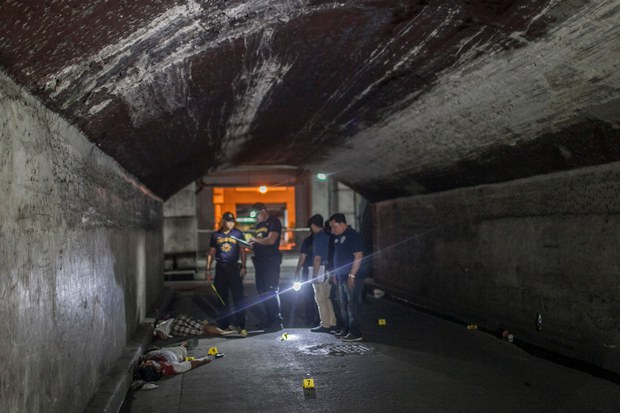Philippines: ICC Examination into Drug War a ‘Futile Exercise’
2019.03.18
Manila
 Police officers check on bodies of suspected drug suspects who were killed in an alleged shootout with authorities in Manila, Nov. 17, 2016.
Police officers check on bodies of suspected drug suspects who were killed in an alleged shootout with authorities in Manila, Nov. 17, 2016.
A day after the Philippines formally exited the International Criminal Court, the government on Monday dismissed as pointless the ICC’s ongoing examination into thousands of killings committed in President Rodrigo Duterte’s drug war, and claimed the court never had jurisdiction over the country.
Presidential spokesman Salvador Panelo scoffed at suggestions by human rights groups that the ICC could still carry on with an examination, which it announced in February 2018. Back then, the prosecutor’s office of The Hague-based international court said it was opening a preliminary examination. However, it emphasized then that this was not an investigation but an initial step, which could lead to an investigation.
The following month, the Philippines announced it was pulling out of the Rome Statute, the international treaty that created the ICC.
Panelo claimed this was a “futile exercise” because the “ICC never acquired jurisdiction over our country.”
While the Philippines was a signatory to the statute, it never really came into force by default because the treaty was not published in a newspaper of general circulation or on the government’s Official Gazette, Panelo said.
“Certainly, we will not allow any attempt at interfering with the sovereignty of this country,” he said, adding that the government was within its rights “to stop them from committing any acts that [would violate] our laws.”
“They cannot undertake anything in connection with jurisdictional exercise of what they have in mind because as we said that is in violation of our laws,” Panelo, a lawyer, said. “The position of the president is unequivocal and inflexible.”
Even the United States, a longtime military ally of the Philippines, had warned of imposing visa restrictions against ICC investigators looking into war crimes allegedly committed by American troops in Afghanistan, Panelo added.
“What is appalling is that the ICC has become a political tool of using its power to politically persecute heads of state, thereby intruding into the sovereignty of this country,” he said. “It is no wonder that powerful countries of the world like the U.S., Russia, China and Israel have withdrawn and, or, did not join the ICC.”
ICC: ‘No impact’ on examination
On Monday, the court said the U.N. had notified the ICC that Manila had sent a letter, which made its withdrawal from the court official.
“The court regrets this development and encourages the Philippines to remain part of the ICC family,” the court said in a statement.
But the withdrawal “has no impact on on-going proceedings or any matter which was already under consideration by the court prior to the date on which the withdrawal became effective,” the ICC stressed.
“The court remains fully committed to its independent mandate to help end impunity in a complementary manner with states, and in so doing, contribute to the prevention of future atrocities,” it said.
And contrary to Panelo’s statement, the ICC said the Philippine had ratified the Rome Statute in August 2011, three months before the treaty entered into force.
The president of the Assembly of States Parties, the legislative body that oversees the International Criminal Court and comprises representatives of more than 120 countries, also expressed regret over the Philippine withdrawal.
“I sincerely hope that the departure of the Philippines from the Rome Statute is only temporary and that it will re-join the Rome Statute family in the future,” O-Gon Kwon, the assembly’s South Korean president, said in a statement. “[T]he ICC relies on the continued support of the international community to ensure its effectiveness in the fight against impunity.”
Rights advocates and experts, meanwhile, have said that the Manila’s withdrawal was a black eye for Philippine diplomacy.
Rights groups like Amnesty International and Human Rights Watch (HRW) said that while the country had left the ICC, investigations into the killings would continue. Amnesty said there were “ways and means” to carry on with investigating alleged rights abuses, but did not cite them.
“Duterte may think that his country’s withdrawal from the ICC is a show of strength. But on the contrary: his bald-faced effort to protect himself from the court’s reach looks more like an act of desperation for a man who appears deeply implicated in alleged crimes against humanity,” Param-Preet Singh, the associate director of HRW’s international justice program wrote Monday.
Singh noted: “Even though the Philippines is no longer a party to the court’s Rome Statute, the ICC can still try crimes committed while the Philippines was a member – from November 1, 2011 until March 16, 2019.”
The Philippines became only the second country to leave the ICC, next to the African nation of Burundi.
In leaving the ICC, the government had stressed that the country had a working justice system to prosecute rights cases and it was not necessary for complainants to go straight to the international court.
The Philippine police have admitted to killing at least 5,000 drug addicts and dealers since Duterte launched his drug war after winning the presidency by a landslide in 2016. But thousands of others are believed to have been slain by pro-government militiamen, in what Manila categories as “deaths under investigation.”







